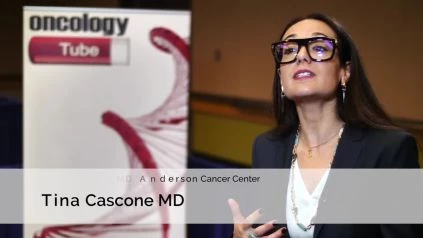Tina Cascone MD Of The University of Texas MD Anderson Cancer Center Discusses Toxicity Of Nivolumab & Ipilimumab: Were Still Learning How To Leverage These Treatments In The Pre-Operative Setting.
BACKROUND:
Neoadjuvant immune checkpoint inhibitors (ICIs) induce major pathologic response (MPR) rates of 20 to 45% in resected NSCLCs. We report the results of NEOSTAR – a phase 2 trial of neoadjuvant N or NI for NSCLCs.
METHODS:
Pts with stage I-IIIA (single N2) resectable NSCLC (AJCC 7th), PS 0-1, were randomized to N (3 mg/kg IV, D1, 15, 29) or N plus I (1 mg/kg IV, D1) followed by surgery (n = 44). Primary endpoint: MPR (?10% viable tumor), hypothesized to be higher than MPR to induction chemotherapy historical controls. Tumor immune infiltrates and pre- & post-ICI tumor PD-L1 % were assessed by flow cytometry & IHC. Wilcoxon ranked sum test & Fishers exact test were used for comparisons.
RESULTS:
44 pts were randomized, 23 N, 21 NI: mean age 66, 64% males, 18% never smokers, 59% adenocarcinomas, stages: IA 8 (18%), IB 15 (34%), IIA 7 (16%) IIB 5 (11%); IIIA 9 (20%). Only 3 pts received < 3 doses due to TRAEs (7%). 34 pts had surgery post ICIs (7 not resected [7/41], 17%, [2 N, 5 NI], 3 pending). There were 10 MPRs in 41 pts overall (24%, 4 N, 6 NI), of which 6 were path CRs (15%, 2 N [9%], 4 NI [21%]). Among 34 resected pts, MPR rate was 29% (N 20%, NI 43%). Median % of viable tumor was lower post NI vs N (20% vs 65%, p = .097). ORR (RECIST v1.1) was 22% (8 PRs [5 N, 3 NI], 1 CR [NI]); 15% of pts had PD (3 N, 3 NI). The proportion of CR+PR in MPR+ was higher than in MPR- (6 [60%] vs 2 [7%], p < .001). Surgical complications included 2 bronchopleural fistulas (BPFs) in N & 8 air leaks (5 N, 3 NI). G3-G5 TRAEs included a death due to BPF post steroid-treated pneumonitis (G5, N); G3 pneumonia, hypoxia, hypermagnesemia (1 each, all N), G3 diarrhea (1 NI). CD3+& CD103+ tissue resident memory CD8+ TILs were higher in NI- vs N-treated tumors (CD3+ 81.2% vs 54.4%, p = .028; CD8+ 56.2% vs 38.3%, p = .069). Median pre-treatment tumor PD-L1 was higher in responders (MPR+, CR+PR) vs non-responders (80% vs 1%, p = .024), and the % of viable tumor was lower in tumors with PD-L1 > 1% vs PD-L1 ?1% (median 20% vs 80%, p = .046).
CONCLUSIONS:
Overall a 24% MPR rate to neoadjuvant ICIs was observed. NI induced a higher % of non-viable tumor and of tissue resident memory TILs vs N. Antitumor activity was associated with higher pre-treatment PD-L1 levels. Clinical trial information: NCT03158129

